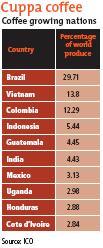Coffee’s going down; who’s up?
Despite the overwhelming popularity of the product, and despite being the world’s fifth most widely traded commodity, many of the estimated 20 million people involved in growing coffee beans have been devastated by the collapse in international prices.
The problem is that while coffee consumption has remained relatively static for 20 years, its production has exploded. Already, stockpiles have been built up due to years of uncontrolled oversupply. Current global coffee supply is estimated to be about 8% above demand.
On an average, the world grinds 103 million bags of coffee a year; and unless coffee drinking patte rn takes off in a big way in populous countries like India and China, the demand supply gap looks unlikely to change. Even in the best of times, coffee farmers receive a fraction of the price consumers pay. In 1992, producer countries earned $10 billion from a global market worth around $30 billion. By 2002, they made less than $6 billion in a market that had actually doubled. This cataclysmic drop in revenue share from 33% to less than 10% has hit poor producers worldwide.
rn takes off in a big way in populous countries like India and China, the demand supply gap looks unlikely to change. Even in the best of times, coffee farmers receive a fraction of the price consumers pay. In 1992, producer countries earned $10 billion from a global market worth around $30 billion. By 2002, they made less than $6 billion in a market that had actually doubled. This cataclysmic drop in revenue share from 33% to less than 10% has hit poor producers worldwide.
Who then is making money from coffee? Well, the lion’s share is captured by big coffee processing groups like Nestlè, Unilever, Starbucks; their swelling profits being a strong evidence to this fact (though they are earning by the legitimate rules of capitalism). Small producers having little or no access to international markets, sell their coffee domestically at ridiculously low prices that don’t even cover costs. The situation is so alarming that with prices touching rock bottom, farmers are contemplating torching their crop (for use as fuel), as it is uneconomic to sell it. Coffee producing nations need to enmasse educate farmers and start developing crop alternatives to ensure their future sustenance beyond coffee. Without institutional support, this change will surely be impossible.
The problem is that while coffee consumption has remained relatively static for 20 years, its production has exploded. Already, stockpiles have been built up due to years of uncontrolled oversupply. Current global coffee supply is estimated to be about 8% above demand.
On an average, the world grinds 103 million bags of coffee a year; and unless coffee drinking patte
 rn takes off in a big way in populous countries like India and China, the demand supply gap looks unlikely to change. Even in the best of times, coffee farmers receive a fraction of the price consumers pay. In 1992, producer countries earned $10 billion from a global market worth around $30 billion. By 2002, they made less than $6 billion in a market that had actually doubled. This cataclysmic drop in revenue share from 33% to less than 10% has hit poor producers worldwide.
rn takes off in a big way in populous countries like India and China, the demand supply gap looks unlikely to change. Even in the best of times, coffee farmers receive a fraction of the price consumers pay. In 1992, producer countries earned $10 billion from a global market worth around $30 billion. By 2002, they made less than $6 billion in a market that had actually doubled. This cataclysmic drop in revenue share from 33% to less than 10% has hit poor producers worldwide.Who then is making money from coffee? Well, the lion’s share is captured by big coffee processing groups like Nestlè, Unilever, Starbucks; their swelling profits being a strong evidence to this fact (though they are earning by the legitimate rules of capitalism). Small producers having little or no access to international markets, sell their coffee domestically at ridiculously low prices that don’t even cover costs. The situation is so alarming that with prices touching rock bottom, farmers are contemplating torching their crop (for use as fuel), as it is uneconomic to sell it. Coffee producing nations need to enmasse educate farmers and start developing crop alternatives to ensure their future sustenance beyond coffee. Without institutional support, this change will surely be impossible.
For More IIPM Info, Visit below....
IIPM Management Introduction ! IIPM Management ! IIPM Management Courses ! IIPM Centers !
IIPM Management Introduction ! IIPM Management ! IIPM Management Courses ! IIPM Centers !

No comments:
Post a Comment